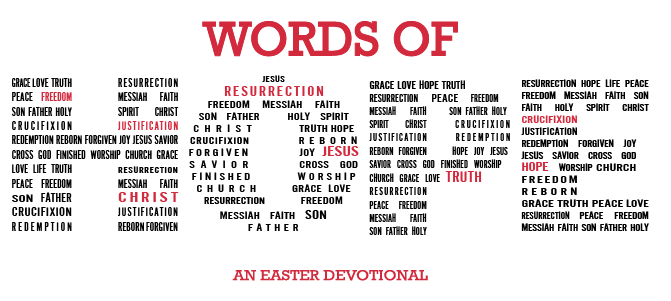DAY 2
Matthew 26:26 Now as they were eating, Jesus took bread, and after blessing it broke it and gave it to the disciples, and said, “Take, eat; this is my body.” 27 And he took a cup, and when he had given thanks he gave it to them, saying, “Drink of it, all of you, 28 for this is my blood of the covenant, which is poured out for many for the forgiveness of sins.
Jeremiah 31:31 “Behold, the days are coming, declares the LORD, when I will make a new covenant with the house of Israel and the house of Judah, 32 not like the covenant that I made with their fathers on the day when I took them by the hand to bring them out of the land of Egypt, my covenant that they broke, though I was their husband, declares the LORD. 33 For this is the covenant that I will make with the house of Israel after those days, declares the LORD: I will put my law within them, and I will write it on their hearts. And I will be their God, and they shall be my people. 34 And no longer shall each one teach his neighbor and each his brother, saying, ‘Know the LORD,’ for they shall all know me, from the least of them to the greatest, declares the LORD. For I will forgive their iniquity, and I will remember their sin no more.”
Consider:
Jeremiah prophesied while the Israelites were in exile under Babylonian rule. He speaks of a future blessing in which the Israelites will no longer be dominated by the generational sins of their fathers (Jer. 31:29-30). Those days are past. God promises to make a new covenant with Israel. Yet, this future covenant is different from the one made at Sinai. The law will not be written on stone; rather, God will imprint it upon the hearts of those who believe. It foreshadows a day in which sin is forgiven and its power broken. This day and this covenant meet in the person and work of Jesus Christ. He ratified the new covenant with his broken body and shed blood (1 Cor. 11:25-26). This forgiveness of iniquity that Jeremiah prophesied comes through Christ’s shed blood.
Point to Ponder and for Prayer:
When Paul recounts the last supper in which Jesus institutes the new covenant (1 Cor. 11:25-26), he tells the Corinthians that the Lord’s Supper is a proclamation of Christ’s death until his return. In that sense, it calls us to look backward and forward. It reminds us that we were formerly once in sin with no hope, but it also declares that we’re awaiting a future day when we will sin no more.
Adam York


